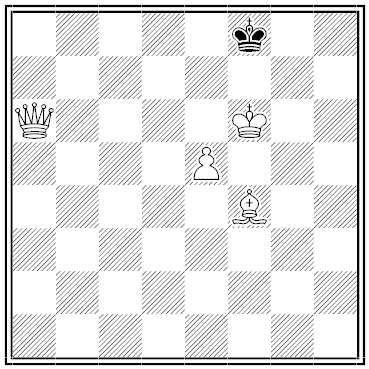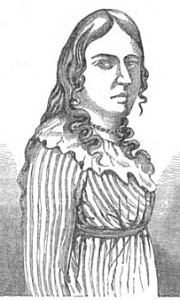
By Joseph Kling, from Chess Euclid, 1849. White to mate with the pawn in three moves.

By Joseph Kling, from Chess Euclid, 1849. White to mate with the pawn in three moves.

noyade
n. a mass execution by drowning
conclamant
adj. crying out together
commorient
adj. dying together or at the same time
J.M.W. Turner’s 1840 painting The Slave Ship recalls a brutal convention in the Atlantic slave trade — an insurance company would reimburse a captain for a slave who was lost at sea, but not for one who died of illness aboard ship. In 1781 Luke Collingwood, captain of the Zong, threw 133 sick and malnourished Africans overboard so that he could claim their value from his insurers. Turner displayed the painting next to lines from his own poem:
Aloft all hands, strike the top-masts and belay;
Yon angry setting sun and fierce-edged clouds
Declare the Typhon’s coming.
Before it sweeps your decks, throw overboard
The dead and dying — ne’er heed their chains
Hope, Hope, fallacious Hope!
Where is thy market now?
Britain had already outlawed its own slave trade when the painting appeared, but its impact encouraged the empire to oppose the institution everywhere.

When Polish composer André Tchaikowsky died in 1982, he left his skull to the Royal Shakespeare Company in hopes that he might appear as Yorick in a production of Hamlet.
No one felt comfortable fulfilling this wish until David Tennant used the skull in a performance in Stratford-upon-Avon in 2008. He continued to use it throughout the production’s West End run and in a later television adaptation.
“André’s skull was a profound memento mori, which perhaps no prop skull could quite provide,” said director Gregory Doran. “I hope other productions may, with the greatest respect for André, use the skull as he intended it to be used, for precisely this purpose.”
(Thanks, Pål.)
An old Danish jester named Yorick
Drank a gallon of pure paregoric;
“My jokes have been dull,”
He said, “but my skull
Will one of these days be historic.”
— Ogden Nash

Five points are located in an equilateral triangle with 10-inch sides (or on its perimeter). What’s the maximum distance between the two closest points?
On May 31, 1964, Cyril Church beat Sylvia Nott into unconsciousness. Thinking he’d killed her, he dumped her body in a river, where she drowned.
Is this murder? The deliberate act wasn’t fatal, and the fatal act wasn’t deliberate. “His case is that he genuinely and honestly believed that she was dead,” Justice Glyn Jones told the jury. “I direct you that, if that was his genuine and honest belief, then when he threw what he believed to be a dead body into the river, he obviously was not actuated by any intention to cause death or grievous bodily harm; you cannot cause death or serious bodily harm to a corpse.”
They convicted Church of manslaughter.
By Franklin Pierce Adams, in Overset, 1922:
To
Herbert Bayard Swope
without whose friendly
aid and counsel every
line in this book was
written.
By E. Greenly, in The Earth, Its Nature and History, 1927:
To the memory of
my wife Annie
the last act of whose life was to
re-read critically the manuscript
of this book.
By Francis Hackett, in The Invisible Censor, 1921:
To
my wife
Signe Toksvig
whose lack of interest
in this book has been my
constant desperation.
By Benjamin Disraeli, in Vivian Grey, 1826:
To
The Best and Greatest of Men
I dedicate these volumes.
He for whom it was intended will accept and
appreciate the compliment;
Those for whom it was not intended will —
do the same.
By John Burroughs, in Bird and Bough, 1906:
To
the kinglet
that sang in my evergreens in October and
made me think it was May.
By Jerome K. Jerome, in Idle Thoughts of an Idle Fellow, 1886:
To the very dear and well beloved Friend of my prosperous and evil days. — To the friend, who, though in the early stages of our acquaintanceship, he did ofttimes disagree with me, has since come to be my very warmest comrade. To the friend who, however often I may put him out, never (now) upsets me in revenge. To the friend who, treated with marked coldness by all the female members of my household, and regarded with suspicion by my very dog, nevertheless, seems day by day to be more drawn by me, and in return, to more and more impregnate me with the odour of his friendship. To the friend who never tells me of my faults, never wants to borrow money, and never talks about himself. To the companion of my idle hours, the soother of my sorrows, the confidant of my joys and hopes, my oldest and strongest Pipe, this little volume is gratefully and affectionately dedicated.
This sentence is true.
Is that sentence true or false?

When George Washington called for volunteers for the Continental Army in 1782, 23-year-old Deborah Sampson dressed as a man and enlisted in the 4th Massachusetts Regiment, giving the name Robert Shurtleff.
She served for 17 months, eating and sleeping with the troops and fighting in several battles in New York — she received a sword wound to the head and a bullet in the thigh, which she removed herself with a penknife.
A doctor discovered her identity when she was hospitalized with fever in summer 1783, but he kept her secret and she was discharged honorably shortly after the Treaty of Paris was signed in September. The government awarded her a pension for her service and extended one to her husband as well, declaring that the Revolutionary War “furnishes no other similar example of female heroism, fidelity, and courage.”
It was quickly forgotten. In 1861 Confederate general Richard Ewell remarked, “Women would make a grand brigade — if it was not for snakes and spiders! They don’t mind bullets — women are not afraid of bullets; but one big black-snake would put a whole army to flight.”

Fanny Paul’s “device for inducing sleep,” patented in 1885, works on a simple principle: It restricts blood flow to the brain. Worry “quickens the action of the heart,” which excites the nervous system; by putting a collar around the neck and tightening it with a screw, the insomniac “slightly modifies” the circulation “and thereby reduce[s] the activity of the brain in order that sleep may ensue.”
“I have experimented with different degrees of pressure upon the arteries and veins of the neck,” Paul wrote, “and find that … very soon after this takes place the nervous system becomes soothed and quieted, and sleep follows almost immediately.”
A dwarf named Richbourg, who was only sixty centimetres (23 1-2 inches) high, has just died in the Rue du Four, St. Germain, Paris, aged 90. He was, when young, in the service of the Duchess d’Orleans, mother of King Louis Philippe. After the first revolution broke out he was employed to convey despatches abroad, and, for that purpose, was dressed as a baby, the despatches being concealed in his cap, and a nurse being made to carry him. For the last twenty-five years he has lived in the Rue du Four, and during all that time never went out. He had a great repugnance to strangers, and was alarmed when he heard the voice of one; but in his own family he was very lively and cheerful. The Orleans family allowed him a pension of 8000 francs.
— Ballou’s Dollar Monthly Magazine, February 1859